 PENGUIN POETS IN TRANSLATION
PENGUIN POETS IN TRANSLATION
GENERAL EDITOR: CHRISTOPHER RICKS PETRARCH IN ENGLISH FRANCESCO PETRARCA (PETRARCH), the son of an exiled Florentine notary, was born in 1304 in Arezzo. In 1312 he went with his father to Avignon, then the seat of the papal court, and in nearby Carpentras began a traditional training in rhetoric. After further education in law at Montpellier and Bologna, he was recalled by his fathers death to Avignon. There, on 6 April 1327, he first saw Laura who inspired the passion commemorated in the Canzoniere, the poetic sequence that future generations throughout Europe were to revere as the great model for love poetry. After some years in the service of Cardinal Colonna, a powerful and enlightened patron, and after travel in France, Germany and Flanders, Petrarch withdrew to Vaucluse (Provence) where he began the Latin epic Africa and the Triumphs. The fame of his learning and poetry grew rapidly and in 1341, on Easter Sunday, he was crowned poet laureate at the Capitol in Rome. In 1353, after the deaths of Laura and Cardinal Colonna, Petrarch left Avignon in disgust at the corruption of the papal court.
Welcomed by the Visconti in Milan, he performed a number of diplomatic missions in Europe before moving on to Venice and finally to Padua. In his last years he completed the Triumphs and reordered and revised the poems of the Canzoniere. He died in July 1374. THOMAS P. ROCHE, JR., Professor of English at Princeton University, was born in New Haven, Connecticut, in 1931. He was educated at Yale, Cambridge and Princeton where he became Murray Professor of English Literature, Emeritus in 2002. He is the author of The Kindly Flame: A Study of the Third and Fourth Books of the Faerie Queene (1964) and Petrarch and the English Sonnet Sequences (1989).
He has edited the essays of Rosemond Tuve and D. W. Robertson and is co-editor with William Oram and Anne Lake Prescott of Spenser Studies: A Renaissance Poetry Annual. He has also published on Sidney, Shakespeare, Petrarch, Ariosto and Tasso. He is currently at work on the iconography of the muses from Hesiod to Milton.
PETRARCH IN ENGLISH
Edited by THOMAS P. ROCHE, JR .
PENGUIN BOOKS To Cleopatra, Julie and Valentina and Bo, without whose help this volume might have taken even longer. PENGUIN CLASSICS Published by the Penguin Group
Penguin Books Ltd, 80 Strand, London WC2R 0RL , England
Penguin Group (USA) Inc., 375 Hudson Street, New York, New York 10014, USA
Penguin Group (Canada), 90 Eglinton Avenue East, Suite 700, Toronto, Ontario, Canada M4P 2Y3
(a division of Pearson Penguin Canada Inc.)
Penguin Ireland, 25 St Stephens Green, Dublin 2, Ireland
(a division of Penguin Books Ltd)
Penguin Group (Australia), 250 Camberwell Road, Camberwell, Victoria 3124, Australia
(a division of Pearson Australia Group Pty Ltd)
Penguin Books India Pvt Ltd, 11 Community Centre, Panchsheel Park, New Delhi 110 017, India
Penguin Group (NZ), cnr Airborne and Rosedale Roads, Albany, Auckland 1310, New Zealand
(a division of Pearson New Zealand Ltd)
Penguin Books (South Africa) (Pty) Ltd, 24 Sturdee Avenue, Rosebank, Johannesburg 2196, South Africa Penguin Books Ltd, Registered Offices: 80 Strand, London WC2R 0RL , England www.penguin.com First published 2005
1 Editorial material and selection copyright Thomas P. Roche, Jr., 2005
All rights reserved The moral right of the editor has been asserted The Acknowledgements on pp. 31112 constitute an extension of this copyright page Except in the United States of America, this book is sold subject to the condition that it shall not, by way of trade or otherwise, be lent, re-sold, hired out, or otherwise circulated without the publishers prior consent in any form of binding or cover other than that in which it is published and without a similar condition including this condition being imposed on the subsequent purchaser ISBN: 978-0-14-193672-7
CONTENTS
INTRODUCTION
In a century where Dante seems to reign supreme, it is time to recognize the simple fact that Francesco Petrarca (130474) was the most important Italian poet for three centuries following his death. No lyric poet in Europe escaped his influence. On the other hand, it must be admitted that more than fifty complete translations of
The Divine Comedy have appeared since the first translation by the Reverend Henry Boyd in 1802, and this cannot be said of Petrarchs
Rerum vulgarium fragmenta, the Latin title for his
Canzoniere, or
Rime sparse, which have been translated only six times in their entirety, the first being the leisure avocation of Captain Robert Guthrie Macgregor while on military service in India (
Odes of Petrarch, 1851, and
Indian Leisure, 1854).
The paucity of complete translations of Petrarch argues not so much a lack of interest in the poetry as the extraordinary difficulty of translating lyrics of such opacity; they seem almost impervious to translation, just like Dantes lyrics. The Divine Comedy has a narrative that eases the translator over the really tough linguistic problems, but a lyric has no narrative, no set of stable characters, no immediately apprehensible narrator. In reading or translating lyrics we are intruders on an overheard conversation or monologue, of which we try to make sense, in order to become part of the conversation, and for this reason translators are fond of appending descriptive titles such as On receiving a pair of his ladys gloves or On seeing his lady bathing, which more often than not impose a more fleshly/physical mise-en-scne than was intended by the author or delivered by the poem. Because of these anomalies of the lyric mode, translators are much more apt to seize on a single poem or a group of poems and to feel no compulsion to complete the entire lyric sequence. Such is the case with Petrarch, who has attracted more gifted amateurs since the Renaissance than any other poet (with the possible exception of Horace) to try their skill at getting a Petrarch sonnet or canzone into English. In the sixteenth and seventeenth centuries such translation was made not only to show the translators skill but also to show that English was as powerful a linguistic medium as Italian.
Once English had established its own literary tradition, the translation was to show the poetic superiority of the poet or poetaster. Needless to say, the latter group was dominant. The aim of this volume, Petrarch in English, is accurately summarized by its immediate predecessor, Bohns Illustrated Library, which produced its complete Petrarch by various hands, in London, 1859. The Preface to that volume contains a paragraph that is no less true today: It is rather a singular fact that, while the other three Poets of this world-famed series Dante, Ariosto, and Tasso have each found several translators, no complete version of the fourth [Petrarch], and in Italy the most popular, has hitherto been presented to the English reader. This lacune becomes the more remarkable when we consider the great influence which Petrarch has undoubtedly exercised on our poetry from the time of Chaucer downwards. Bohns collection of Petrarch in translation and mine deal only with his poems in the vernacular, although he wrote in Latin an unfinished epic poem, Africa, as well as treatises that were to influence the intellectual history of Europe, and thousands of pages of prose letters to friends, to classical authors, which were also to become important documents in European intellectual history.
Petrarch saw his audience as the past, the present, and the future. He was certainly the most important intellectual in fourteenth-century Italy, and the least important of his works for his own century, the
Next page

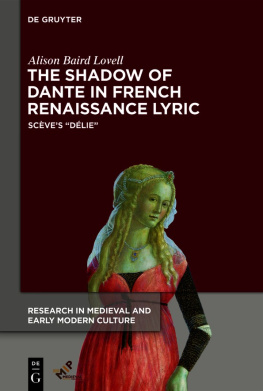

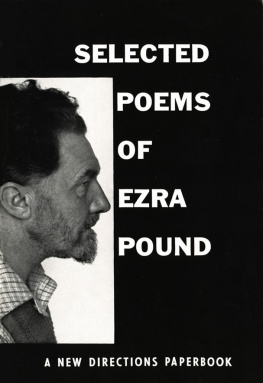
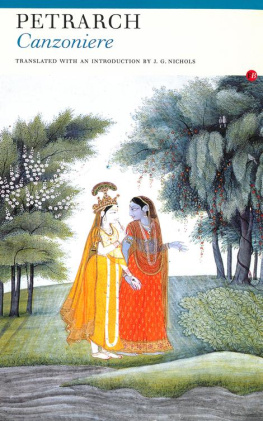
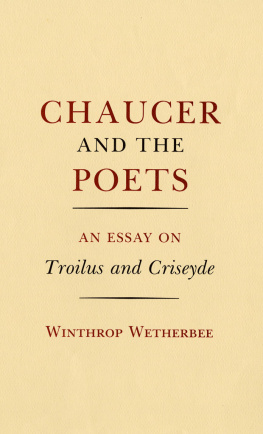
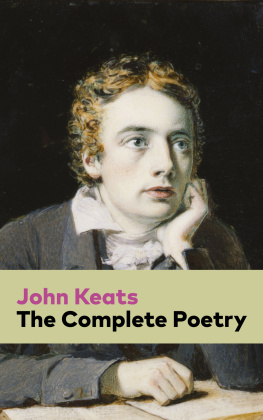
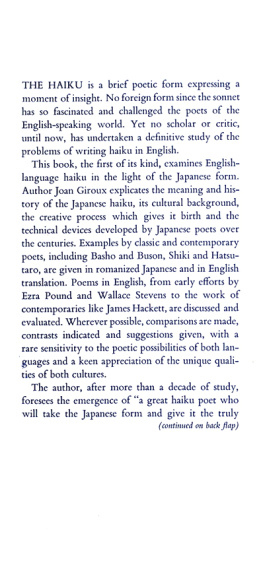
 PENGUIN POETS IN TRANSLATION
PENGUIN POETS IN TRANSLATION